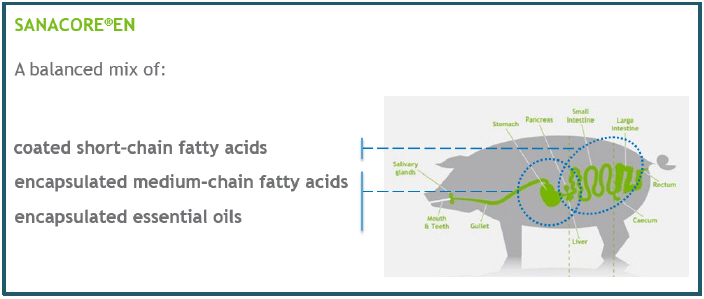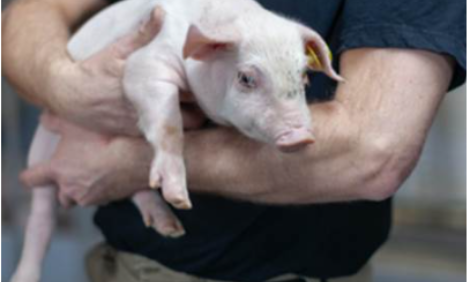



Streptococci Shiver in SANACORE EN
Supporting intestinal health with Nutriad's SANACORE®EN has unique health benefits, says Dutch veterinarian, Dr René Sol.Piglets being fed SANACORE EN, which is gradually released in the gastrointestinal tract, are less likely to suffer from intestinal disorders, and as such they have fewer problems with Streptococcus infections. That is the experience of swine veterinarian, Dr René Sol, who works at DAP Voorthuizen Uddel Garderen (VUG) in the Netherlands.

Since the 2006 ban of antimicrobial growth promoters from pig feeds, swine veterinarian Dr Sol from DAP VUG has been highly interested in alternative remedies that could support optimal intestinal health.
He said: "A healthy intestine is the foundation for a healthy animal performing at a high level. In my opinion, every investment made in improving the animal’s intestinal health, is earned back very easily."
In his veterinary practice, Dr Sol has been using SANACORE EN during the last four years to support intestinal health in many pig farms.
He said: "My experience is that this product adds real value to pig farms with recurrent Streptococcus suis problems. In several pig farms, the average antibiotic Animal Daily Dose per animal year (ADD; Jensen et al., 2004) decreased by 50 to 90 per cent since they started using SANACORE EN in their weaning and growing piglet feeds."
According to Dr Sol, the difficult part with any kind of health additives is that the effects are never 100 per cent identical in each farm.
He said: "Many different factors affect the performance of these products, it is thus very important basic management conditions are satisfied. In other words: the pig farmer must meet the requirements for adequate feed and water provision, as well as minimal hygiene and climate conditions."
Weaning Dip
Piglets are especially sensitive to factors negatively affecting intestinal health. At the end of the lactation period, piglets consume 1 to 1.5 litres of milk per day as well as small quantities of solid feed.
The swine veterinarian explained: "After weaning, the sow milk is taken away abruptly and piglets have to learn to survive on solid feed and water. This extremely stressful event is the cause of the well-known weaning dip in growth. The lack of nutrients and the associated reduced intestinal blood flow cause severe damage to intestinal cells and villi length and surface. It goes without saying that this is disastrous for the digestive capacity of the piglet."
During the post-weaning stress period, the structure of the intestinal barrier function is also affected: intercellular junctions become loose and pathogens find the opportunity to enter the bloodstream.
Dr Sol explained: "It is at this critical moment that streptococci, already present in the intestine, can find their way to the blood stream of the piglet. This is the reason why streptococcal infections in the form of meningitis and sudden deaths often occur two weeks after weaning. In addition, secondary complications with E. coli play an important role further aggravating the issue."
Approach from the Intestine
According to Dr Sol, the correct way to tackle streptococci is to begin with proper nurturing of the intestine in the young piglets. "Supplementation of SANACORE EN in the weaning diet encourages optimal condition of the intestine as the different ingredients of the additive limit the adverse effects following reduced feed intake after the weaning dip."
Dr Sol is basing his experiences with SANACORE EN on farm results seen in several of his customers. "I have noticed significantly lower mortality rates in piglets and also the drug use on the farms has dropped dramatically." According to the veterinarian, feed manufacturers work already on the development of specialized piglet feeds for the same reasons.
Dr Sol refers to SANACORE EN as an 'optimal ' combination of coated salts of organic acids and encapsulated essential oils. This health additive supports the complete gastrointestinal tract thanks to various active components that are released at specific places in the intestine. Whether this theory is finally proven is not crucial for Dr Sol.
He said: "We do not perform scientific research here at the field level; as long as the product works as we expect it to work, we are satisfied. In customers with recurring streptococcal problems that have started to supplement their piglet feeds with SANACORE EN, I hardly have to prescribe antibiotics anymore for piglets. In some farms, with complicated severe problems, that may not respond to this additive, it is usually the case that other infection routes (the airways) as well as the type and the pathogenicity of the Streptococcus present play a determining role in the development of the disease. "
More Than Ten
In the meantime, more than 10 pig farmers of Dr Sol’s practice routinely use SANACORE EN in their feed: dosage in the weaning feed is 3kg per ton, and in the growing feed 2kg per ton. Mixing is done at the feed manufacturer level, as in this way the product can be also included in the pellet.
Cost is not restricting the use of SANACORE EN by pig farmers
Dr Sol said: "Cost is between 35 and 40 Euro-cents per piglet. The savings on antibiotics, extra work, and hassle more than compensate for this expense.
"The fact that pig farmers continue to use the product is for me the strongest evidence that it has a clear effect and is profitable. In fact, in my practice, more and more pig farmers are convinced of the effectiveness of this unique product."
Use in Sows
Furthermore, Dr Sol has experiences regarding the use of this product against Clostridium.
Clostridium is the cause of diarrhoea in the first days of life in piglets. This can be prevented by adding SANACORE EN in the feed of pregnant sows. Starting from three weeks before farrowing, sows are receiving feed containing SANACORE EN in order to reduce the infection pressure in the farrowing house.
Dr Sol concluded: "Supporting intestinal health in sows has shown to have a great effect on piglet well-being. Unfortunately, it is often difficult for sow farmers to provide a specific SANACORE EN-supplemented feed to sows at the end of gestation when sows are group-housed."
Facts on SANACORE EN
SANACORE EN is a product developed by Nutriad to support intestinal health in farm animals. During the development, focus was placed on two pillars: strengthening the intestinal barrier function and preventively controlling the intestinal microbiota. When the composition of the intestinal microbiota is not in balance, the functioning of the digestive system will be disturbed and the animal will be more susceptible to intestinal infections. For this reason, SANACORE EN is based on a well-researched (Ghent University, Faculty of Veterinary Medicine) formula of different active components, each of them with a specific mode of action. For example, the mixture of salts of short-chain fatty acids, medium chain fatty acids, and essential oils results in a broad prophylactic antibacterial effect against both Gram-positive and Gram-negative bacteria, such as pathogenic E. coli, Enterococcus or Salmonella. Furthermore, SANACORE EN stimulates the production of digestive enzymes and the growth of intestinal cells. In addition, through activation of specific genes of these intestinal cells, intercellular connections can be strengthened and excessive inflammatory responses will be toned down. Owing to the specially designed production process of SANACORE EN, the different active components are delivered in the right places in the intestine. For example, a specifically developed coating ensures that butyrate, one of the crucial components in SANACORE EN, is delivered into the more distal regions of the intestine. The combination of the different selected active components as well as the specific technologies that are used, result in the unique antimicrobial and intestinal reinforcing effect of SANACORE EN.

March 2015








